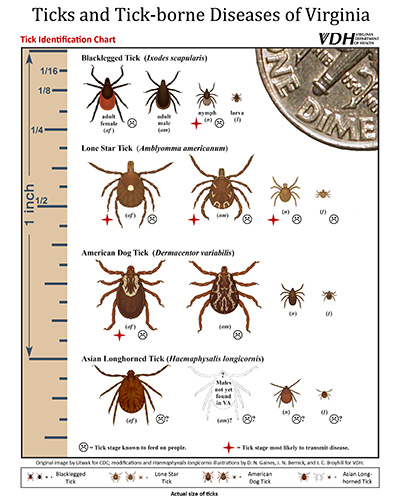Open fires are prohibited throughout the park from midnight to 4 p.m., now through April 30. Learn more.
Avoiding Ticks - Know Before You Go

Ticks are a part of life in Virginia. There are four species of ticks that are a concern Blacklegged (Deer), Lone Star, American Dog and Asian Longhorned ticks. Ticks feed on blood to survive, most only taking 2-3 meals in their lives. While feeding, ticks can potentially spread pathogens that can cause several illnesses in humans and our pets. Check the Virginia Dept. of Health website for more information on tick-borne diseases.
If you are outdoors, you should consider yourself in tick habitat and take these simple steps to reduce your chances of becoming their next meal:
- Hike in the center of trails. Ticks love tall grass and bushes.
- Wear light-colored long sleeves and pants which makes ticks easier to see. Tuck your pants into your socks for a stylish look that makes life harder for ticks.
- Check yourself and your pets often.
- Use insect repellent with DEET or picaridin. Clothes may be treated with permethrin. Follow the manufacturer’s instructions.
- If you are recreating with a dog, make sure they are on a tick preventative.
When you get off the trail do a thorough tick check:
- Take a shower and do a complete check of your body.
- Wash your hiking clothes and dry them in a hot dryer for at least 10 minutes. The heat will kill ticks.
- If you brought your dog, make sure to check them closely too.
Removing ticks:

If you find a tick attached to your skin, you should remove it as soon as possible. Don’t panic, not every tick carries a pathogen and not every bite can transmit them.
- Use pointy tweezers to grasp the tick’s head as close to the skin as possible.
- Pull upward with steady, even pressure. Try not to twist, jerk, squeeze or crush the tick. Do not try to burn the tick off or smothering it in petroleum jelly or nail polish.
- If the tick’s mouthparts break off, you can try to remove them with the tweezers. If that fails, allow the skin to heal.
- Using the tweezers, place the tick in a zippered plastic bag. A little alcohol solution will kill the tick.
- Wash your hands and the wound with soap and water.
- If you develop signs of a rash around the bite or feel ill, consult a doctor and let them know about the tick bite. Bring the bag with the tick if you still have it.
Order your Virginia State Parks
license plate














